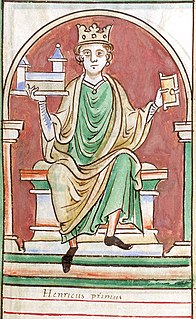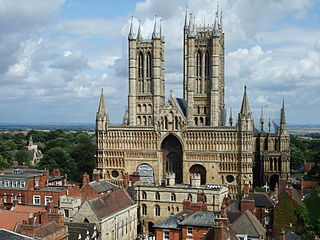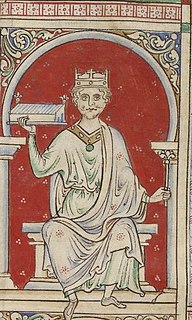
William II, the third son of William the Conqueror, was King of England from 1087 until 1100, with powers over Normandy, and influence in Scotland. He was less successful in extending control into Wales. William is commonly known as William Rufus, perhaps because of his ruddy appearance or, more likely, due to having red hair as a child that grew out in later life.
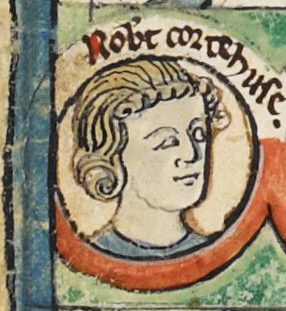
Robert Curthose, sometimes called Robert II, succeeded his father, William the Conqueror as Duke of Normandy in 1087 and reigned until 1106. Robert was also an unsuccessful claimant to the throne of the Kingdom of England. The epithet "Curthose" had its origins in the Norman French word courtheuse "short stockings" and was apparently derived from a nickname given to Robert by his father; the chroniclers William of Malmesbury and Orderic Vitalis reported that William the Conqueror had derisively called Robert brevis-ocrea.
Ranulf Flambard was a medieval Norman Bishop of Durham and an influential government minister of King William Rufus of England. Ranulf was the son of a priest of Bayeux, Normandy, and his nickname Flambard means incendiary or torch-bearer, and may have referred to his personality. He started his career under King William I of England, probably in the compilation of the Domesday Book, as well as being the keeper of the king's seal. On the death of William I, Ranulf chose to serve the new king of England, William Rufus.
William of York was an English priest and Archbishop of York. William has the unusual distinction of having been Archbishop of York twice, both before and after his rival Henry Murdac. He was thought to be a relative of King Stephen of England, and the king helped secure William's election to York after a number of candidates had failed to secure papal confirmation. William faced opposition from the Cistercians who, after the election of the Cistercian Pope Eugene III, managed to have the archbishop deposed in favour of the Cistercian Murdac. From 1147 until 1153, William worked to secure his restoration to York, which he finally achieved after the deaths of both Murdac and Eugene III. He did not retain the see long, as he died shortly after returning to York, allegedly having been poisoned. After William's death miracles were reported at his tomb from the year 1177 onwards, and in the year 1227 he was declared a saint.
Henry of Huntingdon, the son of a canon in the diocese of Lincoln, was a 12th-century English historian, the author of a history of England, the Historia Anglorum, "the most important Anglo-Norman historian to emerge from the secular clergy". He served as archdeacon of Huntingdon. The few details of Henry's life that are known originated from his own works and from a number of official records. He was brought up in the wealthy court of Robert Bloet of Lincoln, who became his patron.
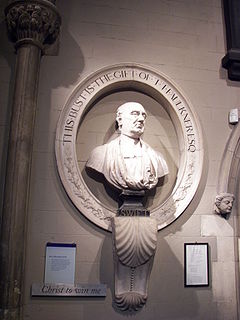
The Dean of St. Patrick's Cathedral is the senior cleric of St Patrick's Cathedral, Dublin, elected by the chapter of the cathedral. The office was created in 1219 or 1220, by one of several charters granted to the cathedral by Archbishop Henry de Loundres between 1218 and 1220.

Remigius de Fécamp was a Benedictine monk who was a supporter of William the Conqueror.
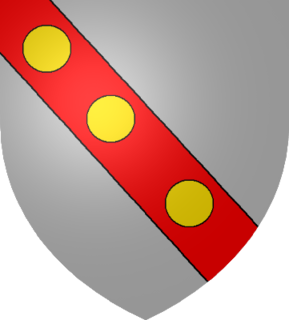
Stephen of Aumale was Count of Aumale from before 1089 to 1127, and Lord of Holderness.
John of Tours or John de Villula (died 1122) was a medieval Bishop of Wells in England who moved the diocese seat to Bath. He was a native of Tours and was King William I of England's doctor before becoming a bishop. After his consecration as bishop, he was either given or purchased Bath Abbey, a rich monastery, and then moved the headquarters of the diocese from Wells, to the abbey. He rebuilt the church at Bath, building a large cathedral that no longer survives. He gave a large library to his cathedral and received the right to hold a fair in Bath. Not noted for his scholarship, he died suddenly in 1122.
Francis Mallet was an English churchman and academic, and chaplain to Mary Tudor.
Arthur William Thomson Perowne was an Anglican bishop in Britain. He was the first Bishop of Bradford and, from 1931, was the Bishop of Worcester.
Robert of Lexinton or Lessington was a British judge and administrator.
William Freind (c.1715–1766) was an 18th-century Church of England clergyman who was Dean of Canterbury from 1760 to 1766.
Edward Gee (1657–1730) was an English churchman, known as a controversialist, and later successively Dean of Peterborough and Dean of Lincoln.
John Prophet (1356–1416) was an English medieval Secretary to King Henry IV, Keeper of the Privy Seal and, Dean of Hereford and York. A distinguished and capable administrator he remained loyal to all kings through a mix of shrewdness, and cunning. Although guilty of simony and pluralism, Prophet was no lollard, but successfully made the transition from Richard II's extravangant court at Westminster to an indispensable servant of the Lancastrians.
Thomas Manning was the Archdeacon of Totnes during 1453 and Dean of Windsor from 1455 to 1461.
Richard of Lincoln was the illegitimate son of Henry I of England, born to Henry and a woman named Ansfride, widow of Aanskill. She is often referred to as Henry’s third mistress. Richard was brought up and educated by Robert Bloet, the Bishop of Lincoln. Bloet had also educated Richard’s half-brother Robert, 1st Earl of Gloucester. Richard is sometimes confused with Richard de Lincoln, an Anglo-Norman prelate who died in 1203.
John Crakehall was an English clergyman and Treasurer of England from 1258 to 1260.

